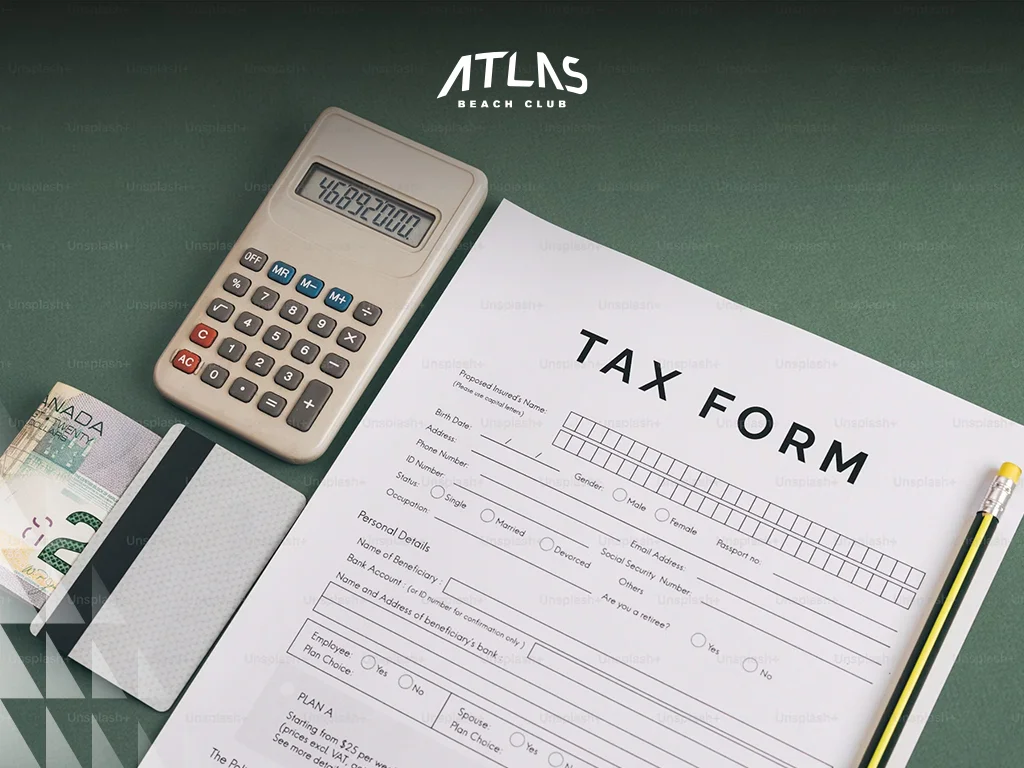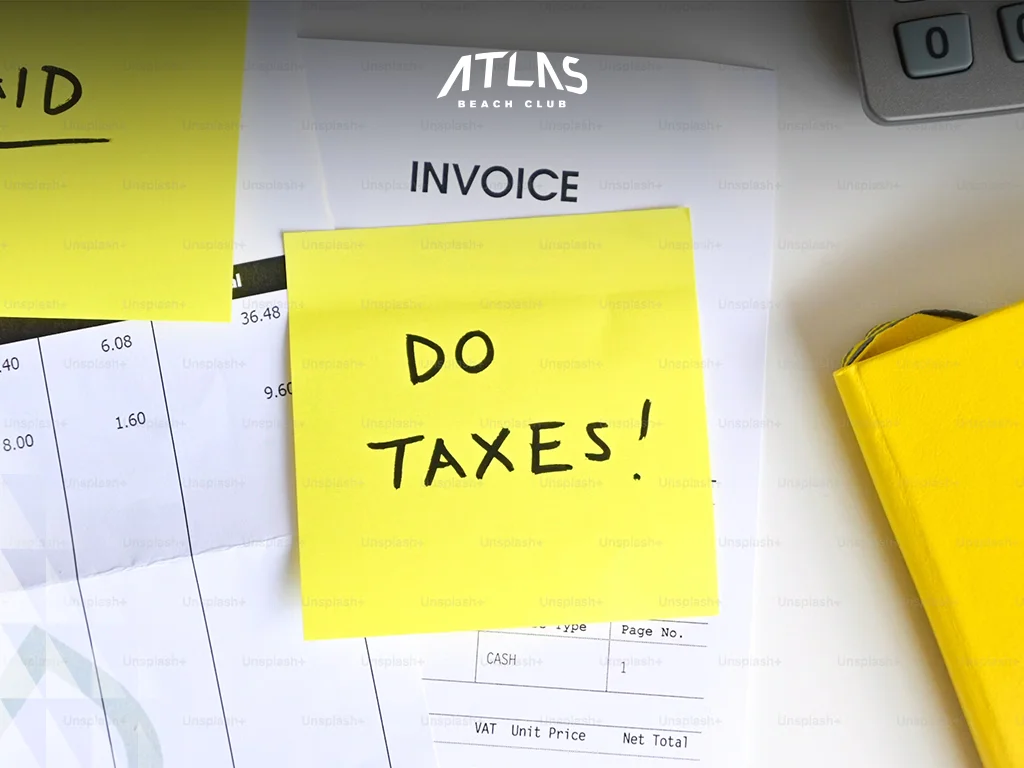Property Taxes in Bali: What You Need to Know!
Investing in property in Bali offers tremendous opportunities, but comes with the responsibility of understanding and managing various property taxes in Bali.
This guide provides an overview of key taxes and obligations every property taxes in Bali owner should know.

Read More : Best Cocktail in Canggu
Understanding Property Taxes in Bali

Navigating property taxes in Bali can be complex, especially for foreign investors and expatriates.
However, understanding these taxes is crucial for anyone looking to buy, sell, or rent property on the island.
This guide provides a comprehensive overview of the main types of property taxes in Bali, including Land and Building Tax (PBB), Rental Income Tax, Property Transfer Tax, and more.
1. Understanding Land and Building Tax (PBB): Property Taxes in Bali Guides

The Land and Building Tax, known locally as Pajak Bumi dan Bangunan (PBB), is a crucial aspect of property taxes in Bali that every property owner must understand.
This annual tax is levied on land and buildings and is administered by the Directorate General of Taxes under the Indonesian Ministry of Finance.
What is PBB?
PBB is the most fundamental property taxes in Bali, applicable to all individuals or entities owning real estate.
The tax is calculated based on the assessed value of both the land and any constructions on it, with the land and buildings valued separately.
This assessment is performed by the tax authorities, considering various factors such as location, size, and usage of the property.
How is PBB Calculated?
PBB is a progressive tax, meaning the rate increases with the property’s value. The rates are as follows:
- Up to IDR 200 million (approximately $13,560): 0.01%
- IDR 200 million to IDR 2 billion (approximately $13,560 to $135,600): 0.10%
- IDR 2 billion to IDR 10 billion (approximately $135,600 to $678,000): 0.20%
- Over IDR 10 billion (approximately $678,000): 0.30%
For example, if you own a property in Bali valued at IDR 1 billion, your PBB rate would be 0.10%, resulting in an annual tax of IDR 1 million.
PBB Tax Reductions
Property owners may be entitled to a 50% reduction in PBB if the land and buildings are used for nonprofit activities.
This includes properties utilized for social, educational, or healthcare purposes.
To qualify for this reduction, property owners must apply and provide evidence of the property’s usage aligning with these criteria.
Who Pays the PBB?
All individuals or entities owning real estate in Bali are required to pay PBB.
This includes both local and foreign property owners.
The responsibility of ensuring timely payment of this tax falls on the property owner.
When to Pay PBB?
PBB is an annual tax that must be paid to the Directorate General of Taxes.
Property owners typically receive a tax notification (Surat Pemberitahuan Pajak Terhutang or SPPT) each year, detailing the amount owed and the due date.
It is crucial to pay this tax on time to avoid penalties and interest charges.

Importance of Paying PBB
Paying the PBB is not only a legal obligation but also ensures that property owners comply with local regulations, avoiding any legal complications or penalties.
Additionally, timely payment contributes to the local government’s revenue, supporting infrastructure and community development projects.
Tips for Managing PBB
Managing property taxes in Bali can be complex, especially for foreign owners unfamiliar with the local tax system. Here are some tips to help you stay on top of your PBB obligations:
- Keep Records: Maintain detailed records of your property’s assessed value and any changes or improvements that may affect its valuation.
- Set Reminders: Mark your calendar with important tax deadlines to ensure timely payments.
- Seek Professional Help: Consider consulting a tax advisor or property management company specializing in Bali’s property tax system. They can provide valuable guidance and assist with tax filings and payments.
- Understand Exemptions: If your property is used for nonprofit activities, ensure you apply for the PBB reduction to benefit from lower tax rates.
By understanding the nuances of the Land and Building Tax (PBB) and staying proactive in managing your tax obligations, you can ensure a smooth and compliant property ownership experience in Bali.
2. Understanding Property Transfer Tax in Bali: Property Taxes in Bali Guides

Property transfer tax, also known as acquisition tax or Land and Building Transfer Duty (BPHTB), is a significant aspect of property transactions in Bali.
This tax is imposed on the transfer of ownership of property and land, and it is crucial for buyers and sellers to understand how it works to ensure compliance and optimize their financial planning.
What is Property Transfer Tax?
Property transfer tax is a one-time tax levied on the transfer of property ownership from one party to another.
In Bali, this tax is applicable to both individuals and entities involved in real estate transactions. The tax is calculated based on the property’s sale price or its assessed value, whichever is higher.
Property Transfer Tax Rates
The property transfer tax rate in Bali is set at a flat rate of 5% of the transaction value.
This means that both the buyer and the seller need to be aware of this cost when negotiating and finalizing property deals.
Calculating Property Transfer Tax
The calculation of property transfer tax involves determining the higher value between the sale price and the assessed value of the property.
Once this value is established, the 5% tax rate is applied to it. For luxury properties, including high-end houses, apartments, and townhouses, an additional luxury-goods sales tax (LST) of 20% may be applicable.
Example Calculation:
- Sale Price of Property: IDR 2 billion (approximately $135,600)
- Assessed Value of Property: IDR 1.8 billion (approximately $122,040)
- Higher Value: IDR 2 billion
- Property Transfer Tax Rate: 5%
- Property Transfer Tax Payable: IDR 100 million (approximately $6,780)
For luxury properties:
- Luxury-Goods Sales Tax Rate: 20%
- Luxury-Goods Sales Tax Payable: IDR 400 million (approximately $27,120)
Who Pays Property Transfer Tax?
In Bali, the responsibility for paying the property transfer tax typically falls on the buyer.
However, during negotiations, the buyer and seller may agree to share the tax burden or have the seller cover a portion of it.
This aspect should be clearly stipulated in the sale and purchase agreement.

When to Pay Property Transfer Tax?
The property transfer tax is due at the time of the property transaction.
This means that the tax payment must be completed when the property ownership is officially transferred from the seller to the buyer.
Timely payment is crucial to ensure that the property transaction is legally recognized and to avoid any legal complications.
Key Additional Considerations for Property Transfer Tax
- Luxury-Goods Sales Tax (LST): For luxury properties, buyers must be prepared to pay the additional luxury-goods sales tax. This tax is calculated at a flat rate of 20% and is applicable to high-value residential properties.
- Legal and Notary Fees: In addition to the property transfer tax, buyers should also budget for legal and notary fees, which are typically required to complete the property transaction. These fees can range from 0.5% to 1.5% of the property’s value.
- Proper Valuation: Ensuring an accurate valuation of the property is essential to determine the correct amount of transfer tax. Working with professional appraisers can help in obtaining a fair and accurate property assessment.
- Tax Documentation: Proper documentation and filing are critical for the property transfer tax process. Buyers should ensure that all necessary tax forms and documents are completed and submitted to the relevant tax authorities.
Example of Property Transfer Tax for a Luxury Property
Consider the following example for a luxury property in Bali:
- Sale Price of Luxury Property: IDR 15 billion (approximately $1,017,000)
- Assessed Value of Luxury Property: IDR 14 billion (approximately $949,200)
- Higher Value: IDR 15 billion
- Property Transfer Tax Rate: 5%
- Luxury-Goods Sales Tax Rate: 20%
Property Transfer Tax Calculation:
Property Transfer Tax Payable:
5% of IDR 15 billion = IDR 750 million (approximately $50,850)
Luxury-Goods Sales Tax Calculation:
Luxury-Goods Sales Tax Payable:
20% of IDR 15 billion = IDR 3 billion (approximately $203,400)
Key Takeaways of Property Transfer Tax
- One-Time Payment: Property transfer tax is a one-time tax paid during the property transaction.
- Flat Tax Rate: The tax rate is a flat 5% of the property’s sale price or assessed value, whichever is higher.
- Luxury Properties: Additional luxury-goods sales tax of 20% applies to high-value properties.
- Buyer Responsibility: Generally, the buyer is responsible for paying the property transfer tax.
- Timely Payment: Ensure timely payment to avoid legal issues and finalize the property transfer.
Understanding property transfer tax is essential for anyone involved in real estate transactions in Bali. By being informed about the tax rates, calculation methods, and payment responsibilities, buyers and sellers can navigate the property market more effectively and ensure compliance with local tax regulations.
Rental Income Taxes in Bali: Property Taxes in Bali Guides

Understanding Rental Income Taxes in Bali
Rental income taxes are a significant consideration for property owners in Bali who lease out their properties.
The Indonesian tax system requires property owners to pay taxes on the income generated from renting out real estate, which is essential for maintaining compliance with local tax laws.
What is Rental Income Tax?
Rental income tax, also referred to as lease tax, is a tax levied on the gross income generated from renting out a property.
This tax is applicable to all individuals or entities who earn rental income from properties located in Bali and other regions of Indonesia.
The tax is reported annually on the property owner’s tax return and is paid to the Directorate General of Taxes.
Rental Income Tax Rates
The rental income tax rates vary depending on the residency status of the property owner:
- Indonesian Tax Residents: Indonesian nationals and foreigners who qualify as tax residents (those who stay in Indonesia for more than 183 days in a calendar year) pay a rental income tax rate of 10% on their gross rental income.
- Non-Tax Residents: Foreign individuals who do not meet the residency criteria pay a higher rental income tax rate of 20% on their gross rental income.
Calculating Rental Income Tax
Rental income tax is calculated based on the total rental income received within a year.
For example, if an Indonesian tax resident earns IDR 100 million (approximately $6,780) in rental income, the rental income tax payable would be 10% of IDR 100 million, which equals IDR 10 million (approximately $678).
Rental Income Tax vs. Personal Income Tax
It is important to note that rental income tax is separate from personal income tax.
Property owners may need to pay both taxes, depending on their total income and the sources of that income.
While rental income tax is specific to income from property rentals, personal income tax encompasses all types of income, including rental income, employment income, dividends, interest, and royalties.
Who Pays Rental Income Tax?
Both Indonesian nationals and foreign individuals who rent out properties in Bali are responsible for paying rental income tax.
Legal entities, such as PT PMAs (foreign-owned companies), are exempt from rental income tax but are subject to corporate income tax on their rental earnings.

When to Pay Rental Income Tax?
Rental income tax is reported and paid annually.
Property owners must include their rental income in their annual tax returns, which are typically due by the end of the third month following the end of the tax year.
This means the filing deadline is usually March 31st of the following year, with the payment due by April 15th.
Corporate Income Tax on Rental Properties
For properties owned by legal entities, such as PT PMAs, corporate income tax is applicable instead of rental income tax.
The corporate income tax rate is a flat 22% on the income earned from renting out the property.
This includes both the rental income and any capital gains derived from the property.
Key Considerations for Managing Rental Income Tax
Managing rental income tax in Bali involves understanding and adhering to several key considerations:
- Accurate Record-Keeping: Maintain detailed records of all rental income and expenses related to the property. This documentation is essential for accurate tax reporting and compliance.
- Professional Assistance: Consider consulting a tax advisor or accountant who specializes in Indonesian tax law to ensure that you meet all tax obligations and take advantage of any applicable deductions or credits.
- Timely Filing and Payment: Ensure that you file your tax returns on time and make payments promptly to avoid penalties and interest charges.
- Understanding Dual Taxation: Be aware that rental income may be subject to both rental income tax and personal income tax. Proper planning and advice can help manage this dual taxation effectively.
Example of Rental Income Tax Calculation
Let’s consider an example to illustrate the calculation of rental income tax:
- Property Owner: Indonesian tax resident
- Annual Rental Income: IDR 200 million (approximately $13,560)
- Rental Income Tax Rate: 10%
Rental Income Tax Calculation:
Rental Income: IDR 200 million
Tax Rate: 10%
Rental Income Tax Payable: IDR 20 million (approximately $1,356)
For a non-tax resident, the same rental income would attract a tax rate of 20%, resulting in a rental income tax payable of IDR 40 million (approximately $2,712).

Read More : Dino Show in Bali
Conclusion : Property Taxes in Bali
Navigating property taxes in Bali might seem daunting, but with the right knowledge and resources, it can be a straightforward process.
Understanding the intricacies of Land and Building Tax (PBB), Rental Income Tax, and Property Transfer Tax is essential for maximizing your investment and ensuring compliance with local laws.
Whether you’re a local investor or a foreign entity, staying informed about these obligations is key to managing your property portfolio in Bali efficiently.
Or you are a property owner, buyer, or investor, staying informed about these taxes will help you make savvy decisions and avoid any legal pitfalls.
Ready to dive into the vibrant Balinese property market? Equip yourself with this knowledge, and watch your investments flourish!
Other Articles
Where is Bali? Bali is a small island that has an incomparable uniqueness. However, Bali is also known as a tourist destination that must be on the bucket list of tourists. But still, lots of people ask, “Where is Bali island located?”. Please note that Bali is an island located in a country called Indonesia. […]
Bali Indonesia Also known as the Land of the Gods and Island of a Thousand Temples. Bali, Indonesia, fascinates the culture passed down from its ancestors with its dramatic dances, traditional music that hypnotizes the mind, ceremonies that are full of meaning and sacred, arts and crafts, to its luxurious hotels and resorts. In Bali, […]
Best Time to Visit Bali Bali is one of the best tourist destinations in the world. Bali has many variations of tourism that you can experience. Even though it has many recreational options, the most important things must be known before you go to Bali. When is the best time to visit Bali? Weather in […]
